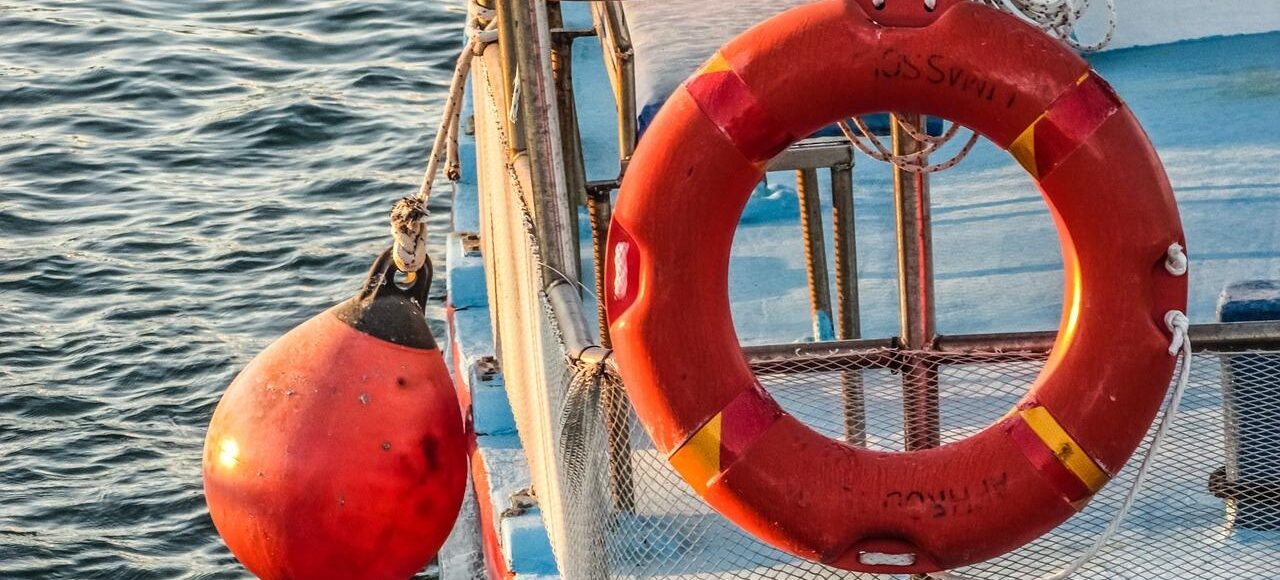Ten Boating Safety Tips

When it comes to boating, safety is the number one priority. With the summer months seeing higher fatalities and accidents on the waterways, it’s imperative that all boat owners, captains, and renters educate themselves on safety methods and resources. Considered as one of the most common leisure activities and one of the most exciting things to do for families, boating has grown as an industry all over the world. This is especially true for coastal areas where water activities are a big part of recreation.
Despite all the fun that is involved in boating, it’s crucial to observe safety regulations for the benefit of everyone in the boat. Read on for some safety tips that might save a life during times of emergency on the water.
1. Always Wear a Life Jacket
Wearing a life jacket while boating is the easiest way to prevent tragedies when out on the water. 76% of fatal boating accident victims drowned; 84.5% of whom were not wearing a life jacket. Simply stowing life jackets onboard your vessel is not an appropriate solution. Accidents happen quickly and leave no time for finding and putting on stowed-away life jackets. Always wear your life jacket.
2. Leave the Beer at the Pier
If you want to enjoy beverages while boating, hiring a captain to drive the boat is crucial. Captained charters are a fantastic solution to this issue, never drink while driving a boat. Alcohol use is the leading contributing factor in fatal boating accidents. Don’t be another statistic – save the alcoholic beverages for later or arrange for a captain to take you around.
3. Drive Defensively
The majority of accidents on the water involve collisions with recreational vehicles (and fixed objects). Excessive speed is a top contributing factor in on-water accidents. Be sure to obey the rules of the waterways, keep your head on a swivel, and watch your speed. Having awareness of everyone and everything around you is going to prevent problems from arising while navigating.
If there is a time to be extremely careful, it should be when you are in unfamiliar territory. Water conditions can be different for every place, and this should pose some caution for those who are beginners and experts alike. There may be other boats in the area traveling in the same path, so maneuvering yours on the defensive side will be the best strategy. Don’t be in a rush, look for signs and other signals that may be cause for alarm for risk. Remember that safety should always be a priority whenever you are boating in a new area.
4. Don’t Slack on Your Boat’s Maintenance
Out of all of the boating accidents that occurred in 2017, machinery failure was the fourth-largest contributing factor. Check your boat’s oil level and coolant level before every trip to avoid problems out on the water. It’s also good for preventing large expenses down the road – if you can catch a small problem with your boat, you can fix it before it turns into a much bigger, more expensive problem. Without regular maintenance, you might end up stuck in the middle of nowhere.
Routine boat maintenance is also part of the safety regulations for almost all states regarding boating. You do not let your machine overwork without giving it time to rest and issuing necessary repairs. Overuse and neglect can lead to disastrous results along the way. If you are a boat owner, have a regular schedule for your boat maintenance. Most accidents are caused by defective machinery so don’t wait for small glitches to become big (and expensive) problems.
5. Take a Boater Safety Course
In 2017, 81% of fatal boating accidents occurred on boats where the operator did not have sufficient boating safety instruction. If you haven’t taken a boater safety course in a while, now is a great time to refresh your memory. In a boat safety course, you will learn about the basic rules, do’s and don’ts, and how to control the boat so as not to disrupt other people who are in the area. Remember that when you are boating, you are not alone in the water. Research, prepare and be aware of your surroundings always.
6. Research boating laws and regulations
When you plan to go boating or fishing across different places, remember to take some time to do your research about regulations of certain States, countries, and local areas. Each one has its own restrictions, so learning about them before a boat trip will save you a whole lot of trouble in the long run. The last thing you want is to get entangled with the law while having your vacation. Know about signs, no-go zones, how to properly conduct yourself while on a boat charter, especially if it is not in your local territory.
7. Know about distress and sound signals
Communication is always the key. Whether you want to signal another boat to move to avoid a collision, or if you’re sending out an SOS for distress, knowing the proper way to send out these signals can save your life. Signals are the key to communicating with other boats and the best way to navigate through waters that are busy with boat traffic. If you know them, you are one step closer to a safe and enjoyable trip, no matter where you might go.
8. Prepare for weather changes
Although there are weather predictions everywhere, the daily report isn’t foolproof. There are times when the weather can suddenly change for the worse while you are boating and are far from shore. If this happens, you’ve got to have a backup plan on what to do. Whether it’s hot or cold, make sure that you have enough supplies on your boat so that you are not in any way unprepared. Preparation is the best way to avert disaster.
9. Bring a boating companion
Never go boating alone. Having another set of hands and eyes while you are boating will ensure that you double-check everything. If you happen to miss a signal or sign along the way, then your lookout can inform you immediately. In case anything happens, you will have someone who can step up and lead so that your trip does not take a turn for the worst. A companion will not only be more fun, but it will ensure a backup plan if there is any need to take some action. It’s always good to have someone to rely on if problems arise on the water.
10. When in doubt, don’t go out
If the weather looks dicey, the waves look choppy, or something within your plans changes that make the boating environment less than optimally safe, it’s always best to err on the side of caution and reschedule your boat day. Even small changes in weather can pose serious problems for boaters, so it’s really important to be extra careful and mindful of the conditions and your surroundings. If you have a bad feeling, cancel or reschedule your boat day. It’s always best to be safe on the water and to rebook when you can enjoy it without risks.
These tips are only some of the most important things to note down when chartering a boat. Whether you are the one operating it or not, it is best to keep in mind precautions to avoid trouble while you are on a relaxing trip. There are so many things to learn about boating. It is one of the most exciting activities and is perfect for fun adventures with friends and family. Bring your camera, take those pictures, relax, and enjoy the breeze while you’re at it.




4 Comments
We see our customers as invited guests to a party, and we are the hosts. It’s our job every day tomake every important aspect of the customer experience a little bit better.
Nemo enim ipsam voluptatem quia voluptas sit aspernatur aut odit aut fugit, sed quia consequans magni dolores eos qui ratione voluptatem sequi nesciunt.
Cras maximus ultricies volutpat. Praesent ut enim non enim vulputate fringilla.
Nemo enim ipsam voluptatem quia voluptas sit aspernatur aut odit aut fugit, sed quia conse